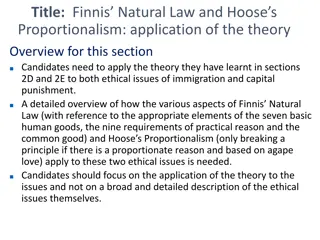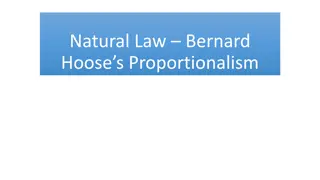John Finnis' Development of Natural Law and Basic Human Goods
John Finnis' theory of natural law focuses on the development of seven basic human goods, including life, knowledge, friendship, play, aesthetic experience, practical reasonableness, and religion. He emphasizes the distinction between theoretical and practical reason, outlines nine requirements of practical reason, and highlights the importance of common good and authority. Finnis rejected liberty, opportunity, and wealth as primary goods, viewing them as intermediate ends. His ethical theory aims to demonstrate universal basic values essential for living worthwhile lives, rooted in human nature.
Download Presentation

Please find below an Image/Link to download the presentation.
The content on the website is provided AS IS for your information and personal use only. It may not be sold, licensed, or shared on other websites without obtaining consent from the author. Download presentation by click this link. If you encounter any issues during the download, it is possible that the publisher has removed the file from their server.
E N D
Presentation Transcript
John Finnis development of Natural Law I. Development of the seven basic human goods (life, knowledge, friendship, play, aesthetic experience, practical reasonableness and religion); II. Distinction between theoretical / practical reason; III. Nine Requirements of Practical Reason (view life as a whole, prioritise certain goods over others, basic goods apply equally to all, do not become obsessed with a particular project, use effort to improve, plan your actions to do the most good, never harm a basic good, foster common good in the community and act in your own conscience and authority); IV. The common good and the need for authority. https://www.youtube.com/watch?v=fnpnKQE_1G0
Discussion Natural Law https://spaces.hightail.com/space/o45hI/files/fi-6c085191-572e- 4fb0-b376-21d9259e8137/fv-5db275a3-3576-4588-9baa- 62fc5f3ba062/A%20Level%20Theme%202%20Natural%20Law%20- %20Gotham%20Series%203.mp4 What are Natural Laws? Do you think Natural Laws exist? If so, what are they? http://www.bdes.org.uk/uploads/7/2/8/5/72851667/starting_a_level _rs_notes_2017.pdf
Universal Self evident What do we need to know about the seven What do we need to know about the seven basic goods ? On A4/3 basic goods ? On A4/3 to complete to complete a. What are they? b. 1. Life c. 2. Knowledge d. 3. Friendship and sociability Valuable for there own sake 4. Play They are obvious 5. Aesthetic Experience 6. Practical reasonableness 7. Religion Theoretical reason Finnis rejected ideals like liberty, opportunity and wealth as primary goods and sees them as intermediate ends that help make the basic values achievable Practical reason
Why did Finnis develop an ethical theory? The problem why did he develop an ethical theory? Natural Law has been criticised by David Hume and Jeremy Bentham. It was seen as derived largely from religion The solution Demonstrate that there are universal basic values that are necessary for us to live worthwhile lives Basic Goods are part of human nature
Seven basic human goods John Finnis Seven basic human goods Life: self-preservation, including the transmission of life Knowledge (for its own sake) Friendship and Sociability: the common good Play (for its own sake), skilled performance Aesthetic Experience Practical Reasonableness, i.e. the ability to reason correctly about what is best for your- self and to act on those decisions. Religion i.e. a connection with, and participation with, the orders that transcend individual humanity Mnemomic
Summarise each principle in less than five words. 1. Life as a whole How can we make decisions using the Seven Goods and Nine Principles 2. Don t ignore a basic good 3. Apply basic goods equally 4. Don t be obsessed project/person 5. Effort 6. Plan do good/avoid evil 7. Never harm a basic good 8. Common good 9. You should act according to your own conscience and practical reason, not the authority of someone else.
Nine Principles of Practical reasonableness 1. 2. You should view your life as a whole, and not live moment to moment You naturally have to prioritise certain goods over others (e.g. an academic would prioritise knowledge higher than a tradesperson), but you should always do so with good reason. You should never arbitrarily discount one of the basic goods. Basic goods apply equally to all people. You can be self-interested to the extent that you are in the best position to look after yourself, but you should always take into account the good of others. A person must commit to all of these basic goods, none can be left out. You should make sure that you do not become obsessed with a particular project, and keep the perspective that the project is a participation of a basic good. A person should not show arbitrary preference among people. In other words: do unto others as you would have them do unto you. Use effort to improve you should actually do projects and make an effort to improve don t just sit around and repeat old habits Plan your actions to do the most good - try to be efficient in our moral choices {e.g. reasonable to save the old woman from the burning house and not her budgie} Never harm a basic good - In every moral act, all the basic values must be remembered. For example, you should not kill even if it will indirectly save more lives later. We must foster the common good of the community You should act according to your own conscience and practical reason, not the authority of someone else. 3. 4. 5. 6. 7. 8. 9.
The common good and authority What is the common good? What do authority figures need to do according to Finnis?
Recap Seven Goods Nine Principles
AO2 Evaluation of Finnis pg 26/27 Weaknesses Strengths 1. 2. 3. 4. 5. 6. 7. 8. 9. 10. Not fluid enough for modern world Doesn t solve Naturalist Fallacy Moral relativism Based on fallible human reason Why those seven values? Adds religion to secular theory Doesn t help with moral dilemmas Similar to utilitarianism Seven basic goods are ethically neutral Not clear 1. More measured than NL 2. Acceptable to atheists 3. More flexible than other theories 4. Makes sense to the modern mind 5. Focus on community
Evaluation questions Use the strengths and weaknesses to answer the questions on pages 28 -30 of Booklet 2
Do the strengths outweigh the weaknesses of Finnis Natural Law Evaluate this view Strengths don t outweigh weaknesses Strengths outweigh weaknesses Which strengths would you choose here? How will you link them back to the questions
Finnis only provides a basis for moral decision making for believers. Evaluate this view Only provides a basis for moral decision making for believers Provides a basis for moral decision making for believers and non-believers
Finnis Natural Law is acceptable in contemporary society. Evaluate this view. Finnis Natural Law is acceptable in contemporary society Finnis Natural Law is not acceptable in contemporary society 2 2 4 give examples 5 1 6























